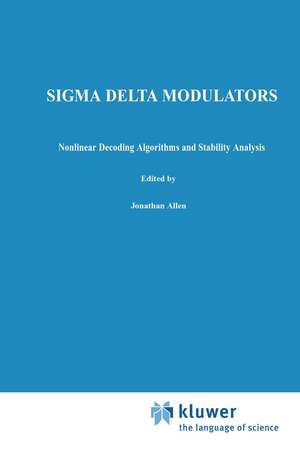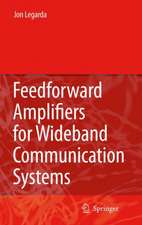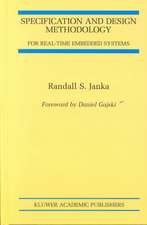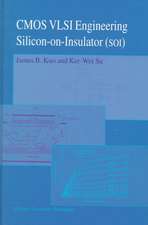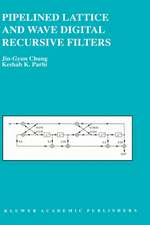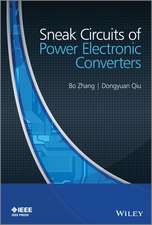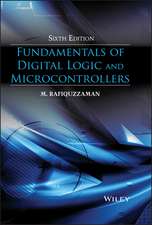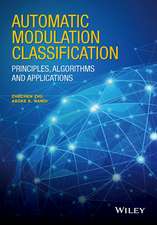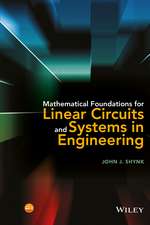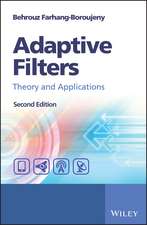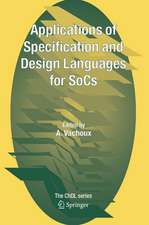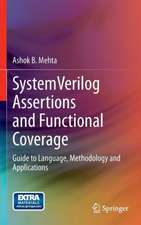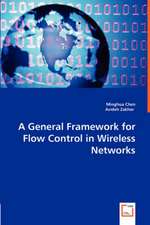Sigma Delta Modulators: Nonlinear Decoding Algorithms and Stability Analysis: The Springer International Series in Engineering and Computer Science, cartea 213
Autor Søren Hein, Avideh Zakhoren Limba Engleză Paperback – 27 sep 2012
| Toate formatele și edițiile | Preț | Express |
|---|---|---|
| Paperback (1) | 943.25 lei 43-57 zile | |
| Springer Us – 27 sep 2012 | 943.25 lei 43-57 zile | |
| Hardback (1) | 950.21 lei 43-57 zile | |
| Springer Us – 31 ian 1993 | 950.21 lei 43-57 zile |
Din seria The Springer International Series in Engineering and Computer Science
- 24%
 Preț: 1041.98 lei
Preț: 1041.98 lei - 20%
 Preț: 643.50 lei
Preț: 643.50 lei - 18%
 Preț: 1225.62 lei
Preț: 1225.62 lei - 18%
 Preț: 965.02 lei
Preț: 965.02 lei - 20%
 Preț: 646.12 lei
Preț: 646.12 lei - 18%
 Preț: 948.79 lei
Preț: 948.79 lei - 20%
 Preț: 646.62 lei
Preț: 646.62 lei - 15%
 Preț: 637.46 lei
Preț: 637.46 lei - 20%
 Preț: 643.83 lei
Preț: 643.83 lei - 18%
 Preț: 949.23 lei
Preț: 949.23 lei - 20%
 Preț: 644.48 lei
Preț: 644.48 lei - 20%
 Preț: 994.92 lei
Preț: 994.92 lei - 20%
 Preț: 645.97 lei
Preț: 645.97 lei - 18%
 Preț: 946.87 lei
Preț: 946.87 lei - 20%
 Preț: 995.57 lei
Preț: 995.57 lei - 18%
 Preț: 956.99 lei
Preț: 956.99 lei - 20%
 Preț: 644.98 lei
Preț: 644.98 lei - 15%
 Preț: 649.54 lei
Preț: 649.54 lei - 18%
 Preț: 950.21 lei
Preț: 950.21 lei - 18%
 Preț: 1221.38 lei
Preț: 1221.38 lei - 18%
 Preț: 957.62 lei
Preț: 957.62 lei - 15%
 Preț: 643.99 lei
Preț: 643.99 lei - 18%
 Preț: 948.47 lei
Preț: 948.47 lei - 18%
 Preț: 947.35 lei
Preț: 947.35 lei - 20%
 Preț: 1284.65 lei
Preț: 1284.65 lei - 20%
 Preț: 1628.31 lei
Preț: 1628.31 lei - 20%
 Preț: 1285.78 lei
Preț: 1285.78 lei
Preț: 943.25 lei
Preț vechi: 1150.31 lei
-18% Nou
Puncte Express: 1415
Preț estimativ în valută:
180.55€ • 196.18$ • 151.76£
180.55€ • 196.18$ • 151.76£
Carte tipărită la comandă
Livrare economică 21 aprilie-05 mai
Preluare comenzi: 021 569.72.76
Specificații
ISBN-13: 9781461363736
ISBN-10: 146136373X
Pagini: 268
Ilustrații: XII, 252 p.
Dimensiuni: 155 x 235 x 14 mm
Greutate: 0.38 kg
Ediția:Softcover reprint of the original 1st ed. 1993
Editura: Springer Us
Colecția Springer
Seria The Springer International Series in Engineering and Computer Science
Locul publicării:New York, NY, United States
ISBN-10: 146136373X
Pagini: 268
Ilustrații: XII, 252 p.
Dimensiuni: 155 x 235 x 14 mm
Greutate: 0.38 kg
Ediția:Softcover reprint of the original 1st ed. 1993
Editura: Springer Us
Colecția Springer
Seria The Springer International Series in Engineering and Computer Science
Locul publicării:New York, NY, United States
Public țintă
ResearchCuprins
1 Introduction.- 1.1 Analog-to-Digital Conversion.- 1.2 Conventional Conversion.- 1.3 Oversampled Noise-Shaping Conversion.- 1.4 Contributions and Outline of Work.- 2 Properties of ONS Converters with Constant Inputs.- 2.1 Introduction.- 2.2 Single-Loop Encoder.- 2.3 Double-Loop Encoder.- 2.4 A Modified Cascade Structure for Constant Inputs.- 2.5 Summary.- 3 Optimal Decoding for ONS Encoders with Constant Inputs.- 3.1 Introduction.- 3.2 Optimal Decoding under Ideal Conditions.- 3.3 Decoding in the Presence of Non-Idealities.- 3.4 Summary.- 4 An SVD-Based Method for Band-Limiting Finite Extent Signals.- 4.1 Introduction.- 4.2 SVD-Based Band Limitation.- 4.3 Implementation of the SVD.- 4.4 Computational Properties of Band Limitation Methods.- 4.5 Results.- 4.6 Summary.- 5 Optimal Decoding for ONS Decoders with Band-Limited Inputs.- 5.1 Introduction.- 5.2 Reconstruction Algorithm.- 5.3 Results.- 5.4 Decoding in the Presence of Non-Idealities.- 5.5 Summary.- 6 Halftone to Continuous-Tone Conversion of Error-Diffusion Coded Images.- 6.1 Introduction.- 6.2 Error Diffusion Coding.- 6.3 Decoding Algorithm.- 6.4 Results.- 6.5 Summary.- 7 Stability of ONS Encoders.- 7.1 Introduction.- 7.2 Framework for Stability Analysis.- 7.3 Double-Loop Encoder.- 7.4 Interpolative Encoder.- 7.5 Summary.- 8 Conclusions.- 8.1 Summary.- 8.2 Extensions.- 8.3 Future Directions.- A Appendix to Chapter 2.- A.1 Derivations for Single-Loop Encoder.- A.2 Derivations for Double-Loop Encoder.- A.3 Proofs of Theorems.- B Appendix to Chapter 3.- B.1 Performance Measures.- B.2 Only Codewords Yield Compatible Bounds.- B.3 Form of Non-Idealities.- C Appendix to Chapter 4.- C.1 Energy Concentration.- C.2 Resolution of the DFT.- C.3 Effect of Windowing.- D Appendix to Chapter 5.- D.1 Quadratic Programming Approximation.- E Appendix to Chapter 6.- E.1 Stability of Error Diffusion Encoders.- E.2 Two-Dimensional SVD Band Limitation.- F Appendix to Chapter 7.- F.1 Upper Bounds on Double-Loop Limit Cycles.- F.2 Design of Double-Loop Encoder.- F.3 Describing Function Method.- F.4 Proofs of Statements in Section 7.5.2.2.
